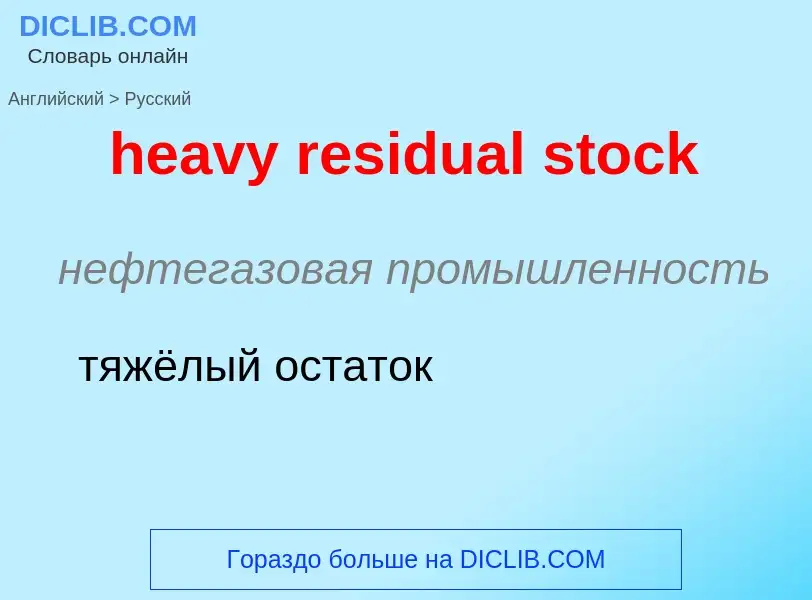Μετάφραση και ανάλυση λέξεων από την τεχνητή νοημοσύνη ChatGPT
Σε αυτήν τη σελίδα μπορείτε να λάβετε μια λεπτομερή ανάλυση μιας λέξης ή μιας φράσης, η οποία δημιουργήθηκε χρησιμοποιώντας το ChatGPT, την καλύτερη τεχνολογία τεχνητής νοημοσύνης μέχρι σήμερα:
- πώς χρησιμοποιείται η λέξη
- συχνότητα χρήσης
- χρησιμοποιείται πιο συχνά στον προφορικό ή γραπτό λόγο
- επιλογές μετάφρασης λέξεων
- παραδείγματα χρήσης (πολλές φράσεις με μετάφραση)
- ετυμολογία
heavy residual stock - translation to ρωσικά
нефтегазовая промышленность
тяжёлый остаток
математика
нормированный остаток
['gʌnbʌt]
существительное
общая лексика
приклад (винтовки)
Ορισμός
Βικιπαίδεια
The Solow residual is a number describing empirical productivity growth in an economy from year to year and decade to decade. Robert Solow, the Nobel Memorial Prize in Economic Sciences-winning economist, defined rising productivity as rising output with constant capital and labor input. It is a "residual" because it is the part of growth that is not accounted for by measures of capital accumulation or increased labor input. Increased physical throughput – i.e. environmental resources – is specifically excluded from the calculation; thus some portion of the residual can be ascribed to increased physical throughput. The example used is for the intracapital substitution of aluminium fixtures for steel during which the inputs do not alter. This differs in almost every other economic circumstance in which there are many other variables. The Solow residual is procyclical and measures of it are now called the rate of growth of multifactor productivity or total factor productivity, though Solow (1957) did not use these terms.

![An [[AK-103]] with its stock folded An [[AK-103]] with its stock folded](https://commons.wikimedia.org/wiki/Special:FilePath/A103a1.jpg?width=200)

![A [[bump stock]] allows semi-automatic firearms to shoot at a faster [[rate of fire]] that somewhat mimics fully automatic fire. A [[bump stock]] allows semi-automatic firearms to shoot at a faster [[rate of fire]] that somewhat mimics fully automatic fire.](https://commons.wikimedia.org/wiki/Special:FilePath/Bump fire animation.gif?width=200)
![[[M1 Garand]] rifle with one-piece wooden stock [[M1 Garand]] rifle with one-piece wooden stock](https://commons.wikimedia.org/wiki/Special:FilePath/Garand.jpg?width=200)

![[[M16A1]] cutaway rifle (top) and M16A2 (below) with a "straight-line" stock configuration [[M16A1]] cutaway rifle (top) and M16A2 (below) with a "straight-line" stock configuration](https://commons.wikimedia.org/wiki/Special:FilePath/M16 Variants.jpg?width=200)

![slide rod]]s slide rod]]s](https://commons.wikimedia.org/wiki/Special:FilePath/SIG̠MPX.jpg?width=200)
![CZ]] [[Škorpion]] with its folding wire stock extended. CZ]] [[Škorpion]] with its folding wire stock extended.](https://commons.wikimedia.org/wiki/Special:FilePath/Submachine gun vz61.jpg?width=200)
![An [[Uzi submachine gun]] with a double-articulated folding stock An [[Uzi submachine gun]] with a double-articulated folding stock](https://commons.wikimedia.org/wiki/Special:FilePath/UZI Submachine Gun (7414624230).jpg?width=200)
![chassis]] system with adjustable buttplate and cheekriser chassis]] system with adjustable buttplate and cheekriser](https://commons.wikimedia.org/wiki/Special:FilePath/XM2010 November 2010.jpg?width=200)
![[[SIG 550]] rifle with folding stock [[SIG 550]] rifle with folding stock](https://commons.wikimedia.org/wiki/Special:FilePath/Caroline-derriere-bipode-p1000524.jpg?width=200)
![[[Colt Army Model 1860]] [[revolver]] with a wooden detachable stock [[Colt Army Model 1860]] [[revolver]] with a wooden detachable stock](https://commons.wikimedia.org/wiki/Special:FilePath/Armystockfull.jpg?width=200)
![Mannlicher]]-style stock Mannlicher]]-style stock](https://commons.wikimedia.org/wiki/Special:FilePath/Ruger 10 22 International.png?width=200)
![[[AK-47]] with a three piece stock consisting of butt, grip and fore-end [[AK-47]] with a three piece stock consisting of butt, grip and fore-end](https://commons.wikimedia.org/wiki/Special:FilePath/AK-47 type II noBG.png?width=200)
.jpg?width=200)
